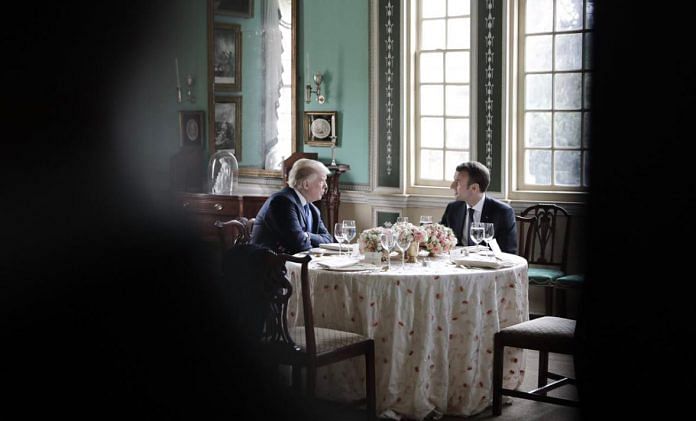French president Emmanuel Macron has arrived in the United States, and as one of the only international leaders who has a good relationship with Trump, is under a lot of pressure. Poland’s ruling Law and Justice party is doing irreparable damage to the country, and the United States needs a better strategy in Syria.
A man on a mission
“Can a 40-year-old French president, who gives sweeping speeches about Europe, singlehandedly save the global liberal order – and western democracy with it – by whispering into a the ear of a 71-year-old US president who has only contempt for the European project and the values it is meant to uphold? To ask the question is perhaps to answer it,” writes Natalie Nougayrede in The Guardian.
Macron has a lot to accomplish on this trip. For starters, he needs to convince Trump not to scrap the Iran deal — and it won’t be an easy task to get done, especially given Trump’s propensity for media antics. He brushed dandruff off of Macron’s head and publicly commented on it in front of the press, and also said he thinks Macron “will make” a good president for France, despite him having been in office for a year now.
“That Macron and Trump make for a truly odd couple in both style and substance only adds more interest. With Britain all but out of the picture, not least as a result of Brexit, and Angela Merkel (who will in turn visit Trump on Friday) suffering from the wear and tear of 13 years in office as well as Trump’s personal animosity, there are obvious opportunities for a French leader who knows how to make the most of his luck,” writes Nougayrede.
“The Macron-Trump “bromance” makes for good headlines, but it hardly camouflages Europe’s vulnerability to US whims. The continent’s weakness is made worse by exposure to regional forces it can’t control, and can only hope to address by harnessing US might.”
““The answer is not authoritarian democracy but the authority of democracy,” Macron said in his Strasbourg speech. Whether Trump fully understands any of this is an entirely different matter, of course. In private, Macron surely smiles about that. He believes he is playing a weak European hand shrewdly, and he’s confident he is only just started. It is perhaps a historical paradox for a Frenchman, but Macron’s road to Europe goes through Washington,” she writes.
Hopefully, Macron’s charm offensive will work and the two can actually achieve something that will be constructive for international politics.
Brazen revisionism
A “combination of subtle and brazen nationalist revisionism” is what captures the rule of the Law and Justice (PiS) party in Poland, writes The Economist. “The party has purged the public administration, made it illegal to accuse the “Polish nation” of complicity in the Holocaust, and peddled conspiracy theories about the aeroplane crash in 2010 which killed then-president Lech Kaczynski and 95 others outside Smolensk, in Russia.” It has also “turned a blind eye to chauvinism”.
“Most troubling, PiS has neutered the constitutional tribunal and given lawmakers and ministers more power over the appointment of judges, threatening their independence. It has sown deep divisions within Poland and with its allies in the European Union, as well as with Israel and America. It has transformed Poland from a poster-boy of post-communist transition into the EU’s problem child. In March a judge in Ireland refused to extradite a Polish defendant to his homeland, worried that he might not get a fair trial.”
“And PiS isn’t done. Mr Kaczynski, who holds no office other than MP yet acts as Poland’s de facto leader, recently told a right-wing weekly that there are “parts of our reality which must not merely be modernised but ploughed over”. His party, he mused, needs at least three terms in office.”
At best, the Economist hopes, the PiS’ reforms can be reversed by the next party that comes into power. “But they have set a precedent: future governments may repeat the cycle of court-packing and purges. In the worst case, Poland may have started down the authoritarian road already travelled by Turkey and Hungary. Today few see this as likely. But when such things shift, they shift faster than anyone expects.”
Strategy in Syria
Referring to the situation in the Middle East, Shlomo Ben-Ami writes in Project Syndicate that the West has “utterly failed to rise to this challenge.”
“Trump is about to withdraw the remaining US troops from Syria, arguing that their main objective – defeating the Islamic State (ISIS) – has been achieved. Yet, while ISIS had to be stopped, it was never the West’s most formidable enemy in Syria; that title goes to the axis of Russia, Iran, Hezbollah, and the Assad regime – an axis against which ISIS was actually a counterbalancing force.”
“So what should a US strategy look like? For starters, an American force should help to stabilize those parts of the country that ISIS has vacated, but Assad does not control. Moreover, the US should use its clout with Turkey and the Syrian Kurds to broker an agreement that enables the creation of an autonomous Kurdish region in Northern Syria. A permanent Turkish-controlled buffer zone could mitigate that country’s fears that fighters and weapons would flow to Kurds inside Turkey,” writes Ben-Ami.
He even says that an “American initiative to bring peace to Syria might even be a blessing in disguise for Russian President Vladimir Putin, as it would enable him to escape a trap of his own making.”
“The last time a US president boastfully proclaimed “mission accomplished” was in 2003, when George W. Bush, just six weeks after invading Iraq, declared that major combat operations there had ended. Instead, those operations lasted eight more years, and US troops remain in Iraq to this day. Trump failed to heed that historical lesson, which suggests that, like Bush, he doesn’t know what the mission is.”



